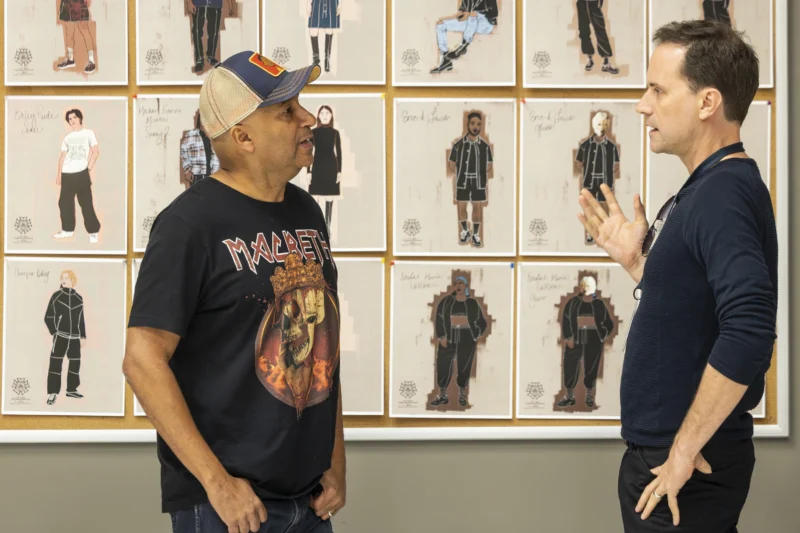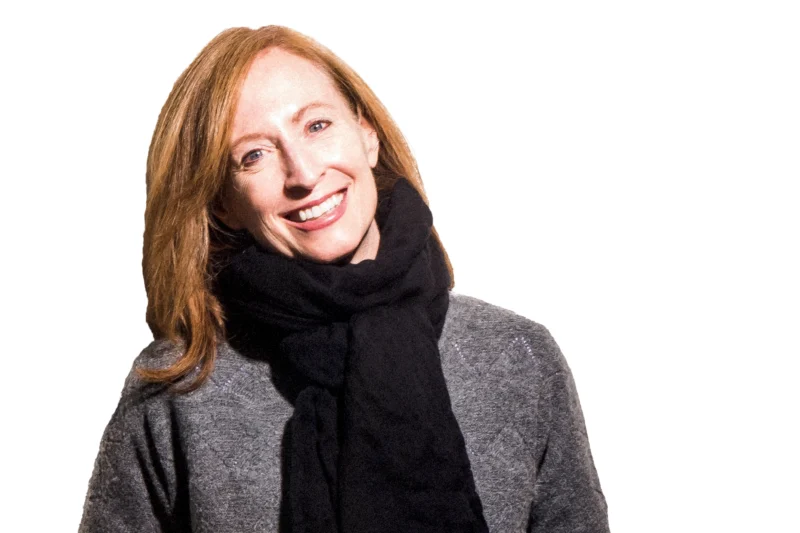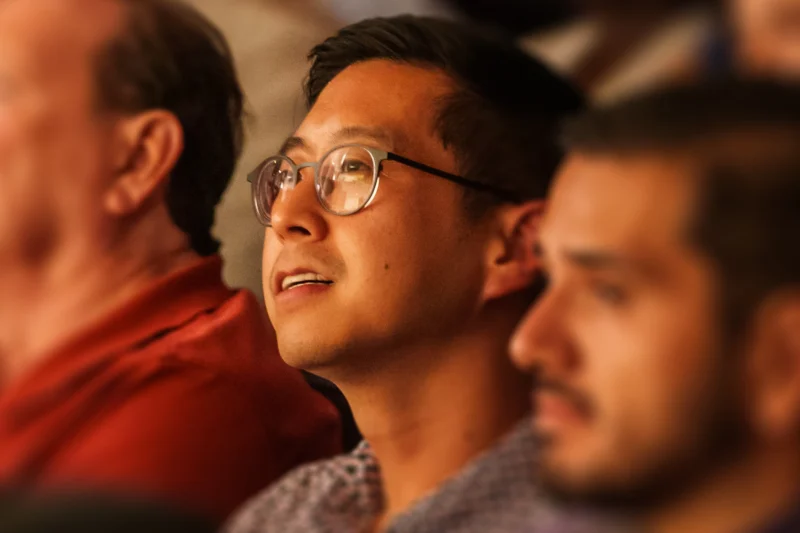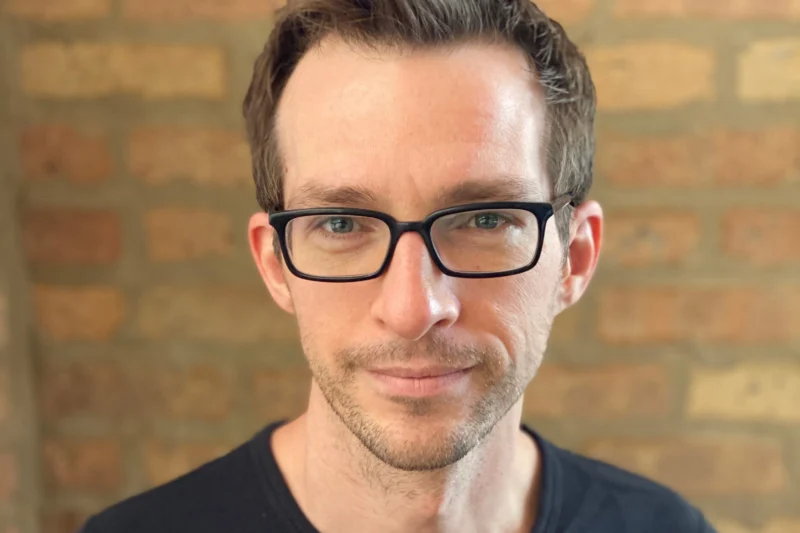By Vicky Mejia
As Latine Heritage Month 2025 comes to a close, the celebration continues with the Dominican-American production, The Brief Wondrous Life of Oscar Wao, on stage at The Goodman starting February 21. We spoke with playwright Marco Antonio Rodriguez and director Wendy Mateo, both of Dominican heritage, on their thoughts of bringing their lived experiences and artistry together and what they hope audiences will take with them after watching the Chicago-premiere of this celebrated production based on the novel by Pulitzer Prize-winning author Junot Díaz.
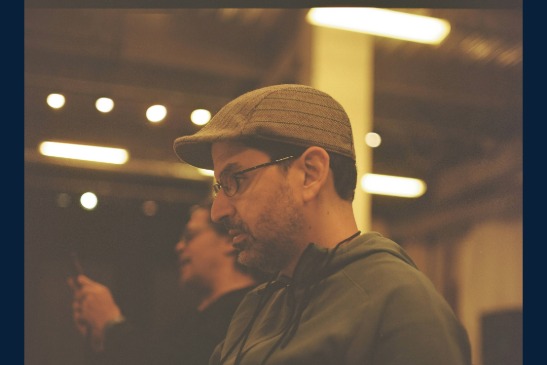
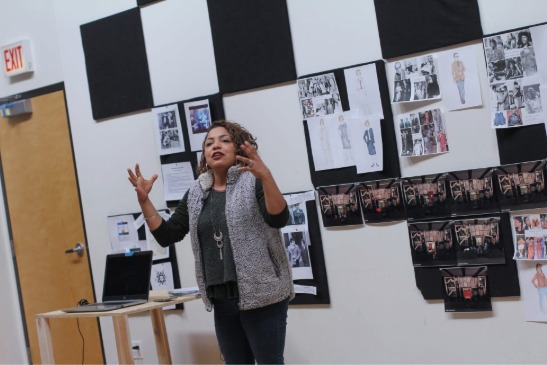
Goodman Theatre: What does it mean to you to bring a Dominican story like Oscar Wao to The Goodman?
Marco Antonio Rodriguez: Growing up, I didn’t see Dominican stories on major stages—certainly not ones that reflected the complexity, humor, and contradictions of our communities. To now bring Oscar Wao to The Goodman is a dream and a responsibility. It says our stories, our language, our rhythm belong in spaces of national conversation, not just in the margins. And it affirms that the Dominican experience is not niche, but part of the American story.
Wendy Mateo: The Brief Wondrous Life of Oscar Wao, both the book and now the play, live in this big, beautiful full-circle moment for me. When I first read the novel back in 2007, it cracked something open in me and caused a seismic shift in how I saw my artistry. At the time, I was a sketch comedy writer and performer navigating a mostly White, male-dominated world. Then along came this book that was so unapologetically Black, so unapologetically Dominican, so unapologetically itself, and it won the Pulitzer! That was revolutionary. It showed me that our stories, the ones filled with messy, magical, complicated, loving, brave humans, my people, were not only worthy, they were extraordinary.
These were people who survived dictatorships and generational trauma, who built new lives out of the rubble of old ones, who laughed loud and danced bachata in the kitchen, even when the weight of silence sat heavy on their hearts. That was my family. That was my community. And that book mirrored it all back to me with love and power.
So now, being a Dominicanita born in the Bronx, the kind of nerdy kid who was into musicals and obsessed with TV but never saw herself in those stories, getting to bring Oscar Wao to life on The Goodman stage is beyond personal. It’s spiritual. It’s legacy work. This story changed me and my own reflection on my childhood. Oscar was a nerd like me, his nerdiness was shaped by comic book culture and anime, but his world expected him to be this Dominican macho guy into dominoes and women. Oscar could never live up to that expectation because his own dreams were far too big for anyone to understand. I get that, on a visceral level. Now I get to help this story reach a new generation, to let them see themselves, their families, their magic, their inner power, in a place that once didn’t hold space for us.
When this opportunity came, I didn’t take it as a coincidence. I treated it with the care that fate deserves. To tell a story this bold, this Dominican, this ours, on one of the most iconic stages in the country? That’s not just an honor, that’s a full-on dream come true.
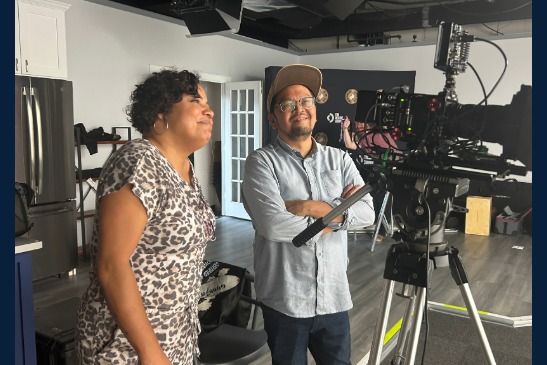
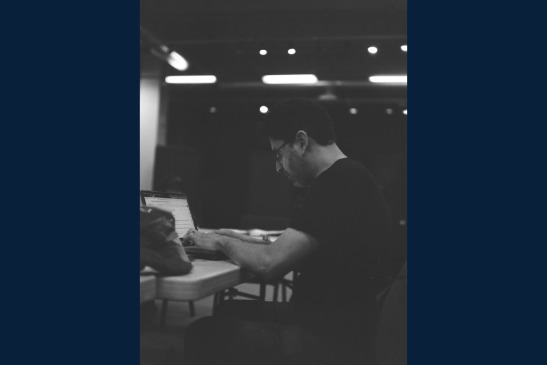
GT: What is something you hope audiences take with them after seeing Oscar Wao?
MAR: I hope audiences leave with a sense that, at his core, Oscar is pure love. He’s awkward, he suffers, he stumbles—but through it all, he continues to love openly and without fear. That’s radical. I want people to reflect on how trauma echoes through generations, but also to see that breaking cycles is possible. If Oscar can keep his heart open, maybe we can too.
WM: I hope audiences walk out feeling like they’ve been on an epic adventure, one that cracks something open in them and leaves them ready to release the weight of what no longer serves them. This story is about confronting the shadows we inherit, the ones we don’t always talk about, but that live in our bloodlines and our memories. Every time I go back to the play in preparation for rehearsals, this quote keeps coming to me and it may sound cliche, but it’s, “The truth shall set you free.” Because freedom isn’t just joy and sunshine; it’s also the willingness to walk through the dark and to face what hurts. There’s a razor-thin line between light and darkness, and we need both to truly live.
I want people to leave Oscar Wao feeling seen, yes, but also charged. Like they’re carrying a spark of liberation in their chest.
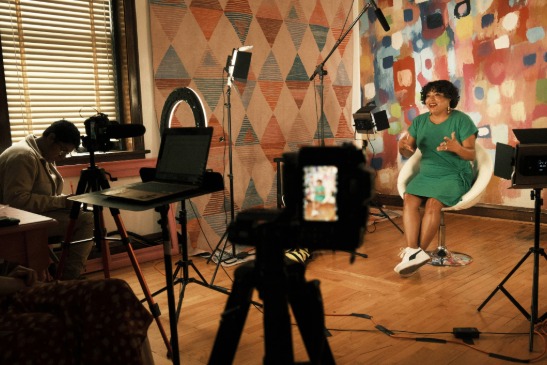
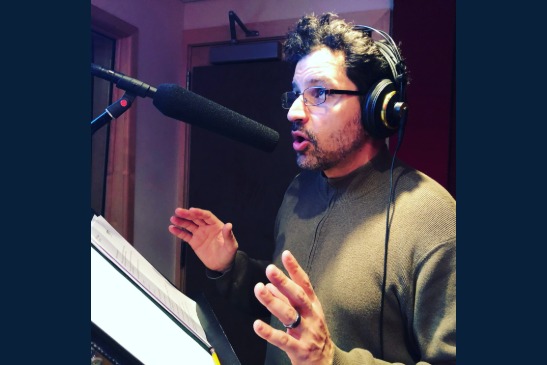
GT: Which character do you most relate to in Oscar Wao and why?
MAR: I relate deeply to Oscar. His outsider-ness, his nerdy obsessions, his longing to be seen and loved—all of that resonates with me as a Queer Dominican kid who often felt like he didn’t fit in either culture. But I also connect with Lola’s fire, her refusal to accept the world as it is. Between the two of them lives the battle I’ve always carried: the dreamer who longs for connection and the fighter who won’t give up.
WM: Ha! That’s a good question! Well, I’m a Pisces, so of course I can’t just pick one, I contain multitudes! LOL.
I’d say it’s a straight split between Oscar and Lola. In Oscar, I see all my beautifully nerdy parts: the kid who was obsessed with stories, who lived half in her imagination, and who maybe overloved people a little too loudly. He’s constantly searching for belonging, for that ultimate sense of comfort in the world and I so get that.
Then there’s Lola. Whew. It’s Lola’s fire, her defiance, her deep need to define herself on her own terms, that speaks to my soul. I relate to her drive to celebrate her Blackness, to dig into her roots, to speak the truth about who she is and where she comes from.
So yeah, I’m half dreamy Oscar, half fierce Lola; a hopeful romantic wrapped in a truth-telling warrior. Classic Pisces energy, amiright?!
GT: Both of you have worked in different mediums such as theatre, filmmaking, television, etc. What are your thoughts on the current state of Latine storytelling across industries?
MAR: We’re in a moment of both frustration and possibility. There’s more visibility than when I started out, but too often Latine stories are still filtered through stereotypes or gatekept by people outside our communities. The exciting part is that more of us are taking the reins—writing, directing, producing our own work—and audiences are hungry for it. The challenge now is making sure the industry moves beyond “checking boxes” and actually embraces the breadth of our stories, from the comic book nerds to the activists to the abuelas casting spells.
WM: Whew! So. Many. Thoughts.
First off. Newsflash to all the producers out there: casting alone doesn’t change a thing. You can fill a stage or a screen with “diverse” faces, but if the people calling the shots: the writers, directors, producers, and execs, don’t come from those lived experiences, you’ll never get the authenticity that truly connects with audiences. Representation isn’t just about who’s seen, it’s about who’s crafting the vision.
What’s happening right now in American theater is both historic and long overdue. The fact that Marco and I, two Dominicans, are leading a major regional production and telling an unapologetically Dominican story shouldn’t be an exception. It should be the norm. The success of productions like Buena Vista Social Club and our friends’ at Mexodus off-Broadway proves that audiences are hungry for the full spectrum of Latine stories, our depth and our complexity. I’m hopeful we’re moving in that direction, but the numbers still tell a hard truth: we’re not there yet.
Latinos make up a $4.1 trillion market, and yet the industry still acts like we’re optional. It’s maddening. Because if we collectively decided to invest our time, our money, and our energy only in the spaces that truly represent us, we’d shift culture overnight. That’s the power we hold. And the more we recognize it, the louder and more unstoppable our stories become.
GT: What does Latine Heritage Month mean to you? Can you please share one way you commemorate the month?
MAR: For me, it’s about honoring the many layers of where we come from—the joy, the struggle, the contradictions. I celebrate by making space for Dominican and Latine artists in my life—going to their shows, buying their books, amplifying their voices. Heritage isn’t just memory; it’s something we keep alive by showing up for each other.
WM: For me, Latine Heritage Month isn’t just a month for me, it’s every month. I commemorate it by showing up as my full, authentic self. I honor my ancestors by lighting the candles on my altar, thanking them for their guidance and their sacrifices. I support my community by intentionally shopping at local Latine and Black-owned businesses and grounding myself in spaces where I can be a voice, using my privilege as an American-born citizen to vote and advocate for issues that impact Latine, Black, and marginalized communities.
I also honor heritage in the most personal way, through raising my daughter. I teach her merengue, share stories of our family history, and make sure she understands the “why” behind how we came to this country, even if her Spanish isn’t fluent yet. Latine Heritage Month is a reminder to celebrate, to carry forward our stories, and to show up for each other in meaningful ways, now more than ever.
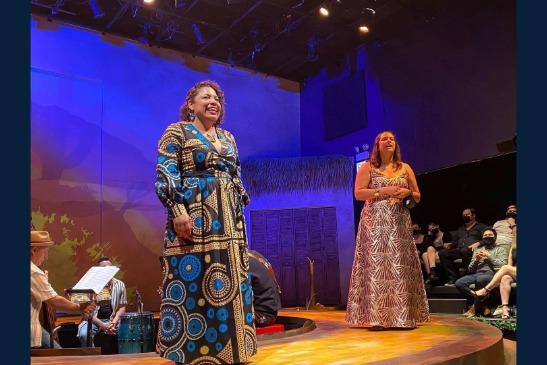
GT: Who inspires your work on and off stage?
MAR: On stage, I’m inspired by writers who aren’t afraid to fuse the personal with the political—Henrik Ibsen, Tennessee Williams, Dominique Morisseau, María Irene Fornés, Jean Genet, Dominican writers Juan Bosch and Franklin Dominguez . Off stage, I am often inspired by my mother. Our complicated relationship, her strength and contradictions, are at the heart of almost everything I write. And then there are the everyday Dominicans I grew up around. Especially the amazing women. Their humor, their poetry, their survival instinct. They remind me why these stories matter.
WM: I’m not being hyperbolic when I say this …. Beyoncé inspires me! Her artistry, her precision, the way she conveys ideas through music and imagery, it’s next-level magic. I’ve drawn from so many of her ideas and energy, the feeling of power she instills in people.
My mom, Wanda, inspires me! She’s a force, a reckoning, with the kindest, most generous heart. To know her is to know her laugh, and if you know my laugh, you know where it came from.
My daughter…. Sigh…. She’s my sun, my moon, my starshine, inspires me every single day. She’s smart, intuitive, and hilarious. I love impressing her, and I can always tell if I’ve succeeded….because her face doesn’t lie.
My comedy comes from my Dominican family, who never met a light they didn’t step into, or a story they didn’t act out through 18 different characters. From a tiny antenna TV in the back room of my mom’s office, where she sold insurance in the Bronx, I was mesmerized by Lucille Ball, Sally Field, Carol Burnett, Marsha Warfield, Gilda Radner, John Leguizamo, Whoopi Goldberg. They shaped how I see performance, timing, and heart.
These days, my inspiration comes from my Chicago artistic community. The women who paved the way, the ones doing it now, and the next generation coming up. There are too many to name without leaving someone out (and I don’t want no drama!), but honestly, this could be a whole follow-up blog just about the women of Chicago. (Hint, hint, wink, wink) Trust me — I’ve got stories. But truly, I am deeply inspired by the work coming out of Chicago and Chicago artists, they’re some of the fiercest I know.
GT: Lastly, what is your favorite Dominican dish?
MAR: Bistec con tostones (flank steak with fried plantains) and a nice green salad with TONS of Dominican aguacate (avocado)! I’m also a HUGE fan of my mami’s Dominican sancocho de gallina (hen soup).
WM: Your base is mangú, which is green plantain boiled and mashed (like potatoes), on the side are your three hits, of salchichón (fried salami), queso blanco (fried white cheese), and huevos frito (fried egg). And then for presentation, you should have some red pickled onions over top and a couple of avocado slices on the side. Ooooh honey I’m hungry! For a good place to grab that dish in the city you’re going to want to go to El Sitio or Tropical Taste in Humboldt Park!
Vicky Mejia is the Digital Marketing Associate at Goodman Theatre

